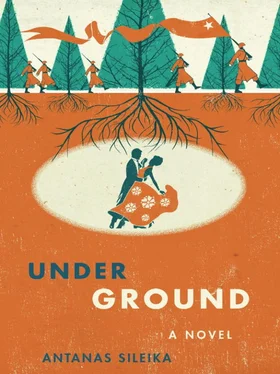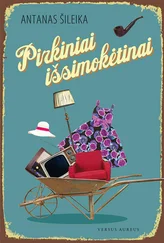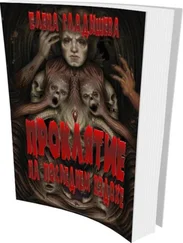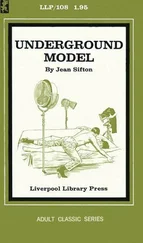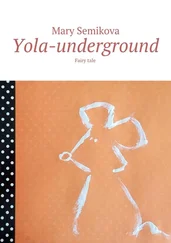They went back to the crossroads where the first partisan had fallen, and then they dragged the bodies of their two dead comrades to the town square. The three men killed days earlier were lying there too, their bodies sheathed in snow. Lakstingala tried to wipe down their faces to look at them, but the faces were just masses of ruined, unrecognizable flesh. One had a rosary draped around his neck, a form of mockery.
Intense gunfire came from two other quarters of the town.
“What do we do next?” asked Lukas.
“Flint was supposed to rendezvous with us here,” Lakstingala said. “We were going to retreat with the bodies on a cart, but now I don’t know if he’ll make it. Lukas, go and see if you can find a sled or Flint. Come back with whichever one you find first. Vincentas, leave the extra rifles and go in the direction of the gunfire and see what you can scout. If you don’t see anything, come back in ten minutes and we’ll retreat with the bodies.”
Each man did as he was told.
Vincentas did not know the town at all, and the smoke and snow made it very hard to see anything. He tried to keep closest to the walls of houses that came between him and the church steeple, but the town was not densely built and there were yards and other gaps that he had to run across.
He checked his ammunition and saw that he had not fired a single shot. And yet he remembered pressing the trigger. He examined his rifle and saw that he had never even taken off the safety. Some soldier he was turning out to be.
Vincentas wanted to pray as he walked into the obscurity, but it seemed obscene to pray with a rifle in his hands. And the intermittent sound of the sniper in the steeple enervated him, even though the gunfire was muffled by the falling snow.
He shivered. His boots, for all their good repair, were soaked right through and his fingertips were so cold he was not sure he would be able to pull the trigger even if he had to.
A burst of machine gun bullets hit the house behind him, and unsure of their origin he turned around the corner of the house, ran into a yard and then ducked around a couple more buildings. He listened for firing from the church steeple, but it had fallen silent.
Now he could not orient himself. The gunfire at the opposite end of town was diminishing and moving. He was lost, unsure how long he had been gone, unsure of which way to go back. He stumbled against a low fence and just managed to keep himself from falling into the unshuttered window of a house. Before he pushed himself away, he saw inside. Their shoemaker was there, sitting in the corner by a candle with his wife. They both looked up at him through the glass, fear on their faces.
They should have left town, as Flint had told them to do. Flint would have been suspicious of their presence, and all the more so because the partisan attack had seemed anticipated. The old couple were lucky Vincentas was the one who stumbled upon them. He waved through the glass, but they did not recognize him.
Vincentas walked on, found a road and followed it, but the snow was thicker, the visibility diminishing. He was afraid he might come across the Reds, but he came instead to the high school, a two-storey red-brick building. He was very tired and cold. He would step inside for just a moment. Two of the three classrooms on the ground floor were empty, but not the third. He found a senior class of high school students and their teacher, all lying on the floor. One of the young men jumped to his feet when he saw him.
“You’re a partisan!” he said. “Have you come to liberate us?”
“Get back on the floor,” said the teacher.
But the young man was not to be stopped. He wore thick glasses and a homespun suit, and was therefore from a poor farm. Vincentas smiled a little to see a younger version of himself.
“The boys in this room are ready to join you,” he said. “We’ll kill the Komsomol girl here and help save the country.”
Poor boy. He would come to regret his words after the partisans withdrew and the Komsomol girl carried home news of what he had said. A harder man, someone like Lakstingala, might shoot the girl to save the boy’s life. Vincentas could not do that, but he tried to do something.
“The partisans don’t need your help now,” said Vincentas. “You can serve your country by finishing your studies and learning how to be good men and women. And the first thing you have to learn is not to betray one another. You, young woman, is it true you’re in the Komsomol?”
She could not reply. She was weeping.
“Well, it doesn’t matter. As long as you never intended to hurt anyone. And even if you have joined the Komsomol, you must love your classmates. How can you love your country unless you love the people in it? Study hard, and be good students.”
Vincentas suddenly became aware of himself, a dirty, wet man with a rifle in his hand giving a small sermon to the boys and girls. How long had he been gone from Lakstingala’s band? He wasn’t sure. He had to get out of there. He told the high school students to stay on the floor and listen to their teacher and not move until all the firing in the town had stopped.
Back out on the street, he heard very little gunfire. It occurred to him that the partisans might have retreated without him. Flint had drawn a rough map of the town and made them memorize it, and now that he knew he was at the school he might be able to orient himself and find his way back to the square.
But the snow and the smoke were bewildering, and soon he lost his orientation again. Two figures in white appeared in front of him, both of them dressed in battle gear, as Lakstingala and some of the others had been. He raised his hand to wave to them, and realized too late they were Reds. He raised his rifle at them and pressed the trigger but had forgotten to take off the safety. Rather than reach for it, he muttered the opening words of the last act of contrition.
AUGUST 7, 1945
THE WAR had ended for the Westerners in Europe on May 8, 1945, after which Germans and Americans, English and French and others all laid down their arms and began the hard road to peace, the rebuilding of ruined cities, the denazification that would clear away the old enemies, and the counting of the dead that would lead to an understanding of the horror that innocent people had suffered through.
But in the East, no such end came. Instead, in Estonia, Latvia and Lithuania, in Ukraine and Byelorussia and parts of Poland, the war went underground. For a while the partisans fought pitched battles from fixed positions, but now that Germany was defeated, the Reds could turn and devote their strength to making the new lands conform to their plan.
In the West, the demobilized soldiers went home to build homes and garages and to fill them with refrigerators, washing machines, televisions and cars. In the East, the project begun in the Soviet Union twenty years earlier was continued, and the farmers were stripped of their land. The mass deportations began in earnest again, the cattle cars rolling northeastward with hundreds of thousands of men, women and children, many to be starved, frozen or worked to death. Whole categories of people were doomed: school principals, former government bureaucrats, former army officers all the way down to sergeants, policemen, train conductors, nuns, monks and many priests, shop owners, and any farmers rich enough to have had hired hands.
The Reds could sweep the countryside and hold it as long as they were present, but as soon as they left, the partisans came out of their bunkers again to assassinate the local Reds whose job it was to collect requisitions, police the streets and, in particular, check the myriad documents that the regime began to issue. These documents multiplied till they became like the strips used to wrap mummies, and with the same effect: the immobilization and entombment of the bodies of the inhabitants.
Читать дальше
